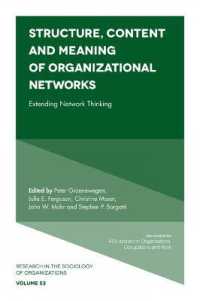- ホーム
- > 洋書
- > 英文書
- > Philosophy
Full Description
The issue of debt and how it affects our lives is becoming more and more urgent. The "Austerity" model has been the prevalent European economic policies of recent years led by the "German model". Elettra Stimilli draws upon contemporary philosophy, psychology and theology to argue that austerity is built on the idea that we somehow deserve to be punished and need to experience guilt in order to take full account of our economic sins. Following thinkers such as Max Weber, Walter Benjamin and Michel Foucault, Debt and Guilt provides a startling examination of the relationship between contemporary politics and economics and how we structure our inner lives.
The first English translation of Debito e Colpa, this book provokes new ways of thinking about how we experience both debt and guilt in contemporary society.
Contents
Introduction
Chapter One: Debt: Between Appropriation, Exchange, and Gift
1. The Problematic Context
2. Appropriation
3. Exchange
4. Gift
Chapter Two: An Open Question
1. The Neoliberal Turn
2. The Society of Generalized Debt
3. The Paradigm of Man in Debt
Chapter Three: Between Political Theology and Economic Theology
1. Beyond the Boundaries of Economic Science
2. Religion, Politics, and Economics
3. "Faith" in the Era of the Predominance of Finance
4. Debt and Sacrifice
5. Guilt and Violence: At the Origin of Juridical Power
Chapter Four: The Religion of Debt
1. Bare Life and the Law
2. Capitalism: A Cult with no Theology
3. Economy and Regulatory Experimentation
4. The Invention of Oikonomia
5. Debt as Investment
Chapter Five: The Psychic Life of Debt
1. The Guilt of Being in Debt
2. Establishing the Rule: Psychic Dimension and Social Sphere
3. Feminism and Neoliberalism
4. The Mystery of Guilt and the Psychic Life of Power
5. Envisioning New Ways of Assuming Power
Conclusions
Bibliography
Index








